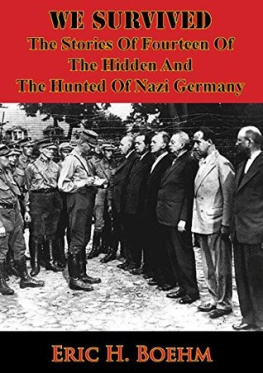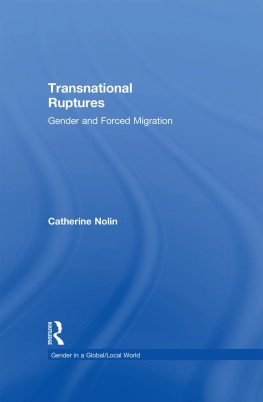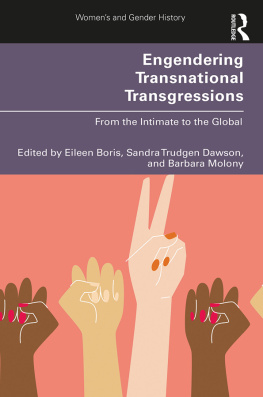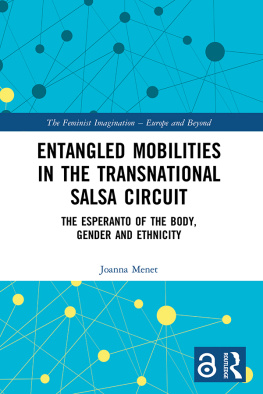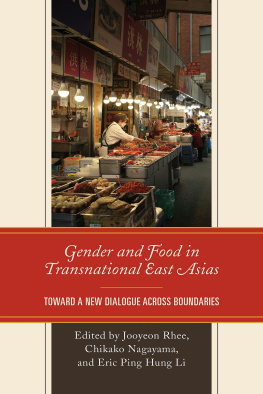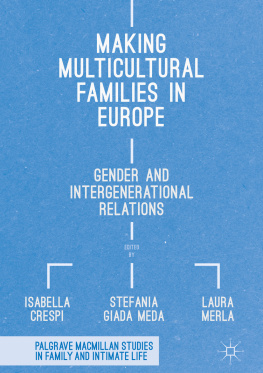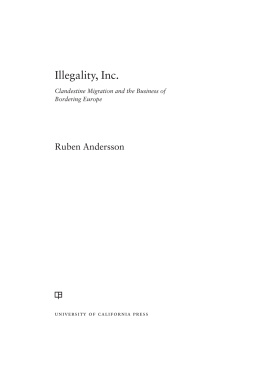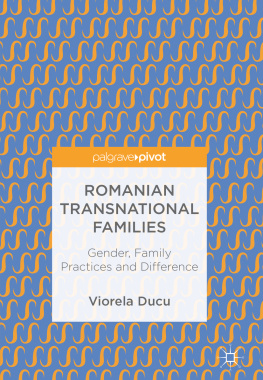Thank you for buying this ebook, published by NYU Press.
Sign up for our e-newsletters to receive information about forthcoming books, special discounts, and more!
Sign Up!
About NYU Press
A publisher of original scholarship since its founding in 1916, New York University Press Produces more than 100 new books each year, with a backlist of 3,000 titles in print. Working across the humanities and social sciences, NYU Press has award-winning lists in sociology, law, cultural and American studies, religion, American history, anthropology, politics, criminology, media and communication, literary studies, and psychology.
Intimate Migrations
Intimate Migrations
Gender, Family, and Illegality among Transnational Mexicans
Deborah A. Boehm

NEW YORK UNIVERSITY PRESS
New York and London
www.nyupress.org
2012 by New York University
All rights reserved
References to Internet websites (URLs) were accurate at the time of writing. Neither the author nor New York University Press is responsible for URLs that may have expired or changed since the manuscript was prepared.
Library of Congress Cataloging-in-Publication Data
Boehm, Deborah A.
Intimate migrations : gender, family, and illegality among transnational Mexicans / Deborah A. Boehm.
p. cm.
Includes bibliographical references and index.
ISBN 978-0-8147-8983-4 (cloth : acid-free paper)
ISBN 978-0-8147-8985-8 (ebook)
ISBN 978-0-8147-8986-5 (ebook)
1. Mexicans United States Social conditions.
2. Mexican Americans Social conditions.
3. Immigrants United States Social conditions.
4. Transnationalism. 5. Sex role United States.
6. Mexican American families. 7. Immigrant families United States.
8. Illegal aliens United States.
9. United States Emigration and immigration Social aspects.
10. Mexico Emigration and immigration Social aspects. I. Title.
E184.M5B59 2012
304.873072 dc23
2011043847
New York University Press books are printed on acid-free paper, and their binding materials are chosen for strength and durability. We strive to use environmentally responsible suppliers and materials to the greatest extent possible in publishing our books.
Manufactured in the United States of America
10 9 8 7 6 5 4 3 2 1
For Ava, and in loving memory of my grandmother, Lufteria Gabona Christie Boehm, the first immigrant to tell me her story.
Contents
We are from both sidesfrom here and from there. I suppose we are from two places.
Victor
I think that I am divided... I think of home as half there, half here.
Luca
I wander about... I am from neither here nor there!
Ofelia
Acknowledgments
As a child, I was often shown a photograph of my grandmother and her familyimmigrants from Macedoniataken in the early twentieth century when my grandmother was just four years old. The family is gathered together, staring at the camera with serious expressions, a reflection of the poverty, war, and survival that defined their lives. But this photograph of a family united is an illusion of sorts: the image was created transnationally. A photograph of my great-grandmother and her children was taken in a town close to their small village that is now part of Greece; this was joined with another photograph of my great-grandfather and my grandmothers eldest brother, taken years before the family was actually reunited, at a small studio in Portland, Oregon. It was an attempt to reunite those in the homeland, at least visually, with the men in the family who had already migrated to the United States. The photograph, especially the story behind it, made an impression, and as I have conducted research with transnational Mexicans, the image and its sentiment have stayed with me.
While there are parallels between the migration experiences of my family and those of transnational Mexicansmany of which I explore in this book, including divided and reunited kin, the distinctly gendered aspects of movement, and the effect of migration on people of all ages including childrenthere are also striking differences. My grandmother and her family arrived by ship to New York City and, after an immigration official changed their surname, they were sent on their way and boarded a train west. This is, of course, quite different from the border crossings of Mexican migrants into the United States in recent decades. My great-grandparents and my grandmother became U.S. citizens through a relatively simple process, and in a manner essentially impossible for the migrants I know. I hope that readers will situate this account of Mexican migration within a historical and cross-cultural frame, recognizing the similarities with previous migrations to the United States, but also the distinct circumstances that Mexican nationals face in the early twenty-first century. I am grateful to my late grandmother for sharing the stories of her migration, as they have directed and continue to guide my work.
Although my research has personal beginnings, it is the product of years of scholarship and has been shaped by exchanges with many mentors, colleagues, and students. I want to recognize the talented and devoted teachers who have contributed to different stages of my education and fostered my own dedication to becoming an educator. I thank my doctoral committeeLouise Lamphere, Carole Nagengast, Sylvia Rodrguez, and the late Michael Kearneyand scholars who have commented on my work at different times and provided mentorship and guidance: Leo Chavez, Susan Coutin, Yen Le Espiritu, Elzbieta Godziak, Joe Heyman, Gail Mummert, Roger Rouse, Louisa Schein, Dianna Shandy, Lynn Stephen, and Susan Terrio. I have also had the good fortune of working closely with many individuals as co-author and co-editor, and I thank these friends and colleagues, including Bianet Castellanos, Cati Coe, Julia Meredith Hess, Heather Rae-Espinoza, Rachel Reynolds, and Heidi Swank.
I appreciate the many opportunities for exchange with scholars and friends in both Mexico and the United States. I thank those I have met during classes, seminars, writing groups, workshops, and fellowships: Jeanette Acosta, Carina Alencar, Jiemin Bao, Judy Boruchoff, Beth Buggenhagen, Nancy Burke, Mnica Daz, Joanna Dreby, Tory Gavito, Nora Haenn, Sarah Horton, David Martin, Hctor Mendoza, Mariela Nuez-Janes, Ethan Sharp, Karen Stocker, and Rachael Stryker. I also thank Olga Giller and Michael Ramos, my co-teachers in Albuquerque, ex-pats Mark and Patricia Dunn, and Rita McGary, a tireless advocate for migrants. My time at the Center for U.S.-Mexican Studies and the Center for Comparative Immigration Studies at the University of CaliforniaSan Diego was particularly fruitful, and I am grateful for this invaluable support. Thanks to Wayne Cornelius for creating this special place for scholarship, and to those I met during my residency, including Fernando Alanis, Xavi Escandell, Lieba Faier, Gaby Sandoval, Suzanne Simon, Maria Tapias, Gaku Tsuda, and Carolyn Pinedo Turnovsky.
Several organizations have provided funding and support that made this project possible. My experience as a WorldTeach volunteer in Guayaquil, Ecuador, introduced me to and fostered my interest in Latin America. During graduate studies at the University of New Mexico, I received grants from a number of departments and organizations: a Foreign Language and Area Studies (FLAS) Title VI Fellowship; PhD Fellowships from the Latin American and Iberian Institute and the Center for Regional Studies; the Bunting Award from the Department of Anthropology; and research and travel grants from the Department of Anthropology, Department of Family and Community Medicine, Graduate and Professional Student Association, Latin American and Iberian Institute, Office of Graduate Studies, Southwest Hispanic Research Institute, and Women Studies Program. A David L. Boren Graduate International Fellowship from the Academy of Educational Development provided essential funding for dissertation research.
Next page


